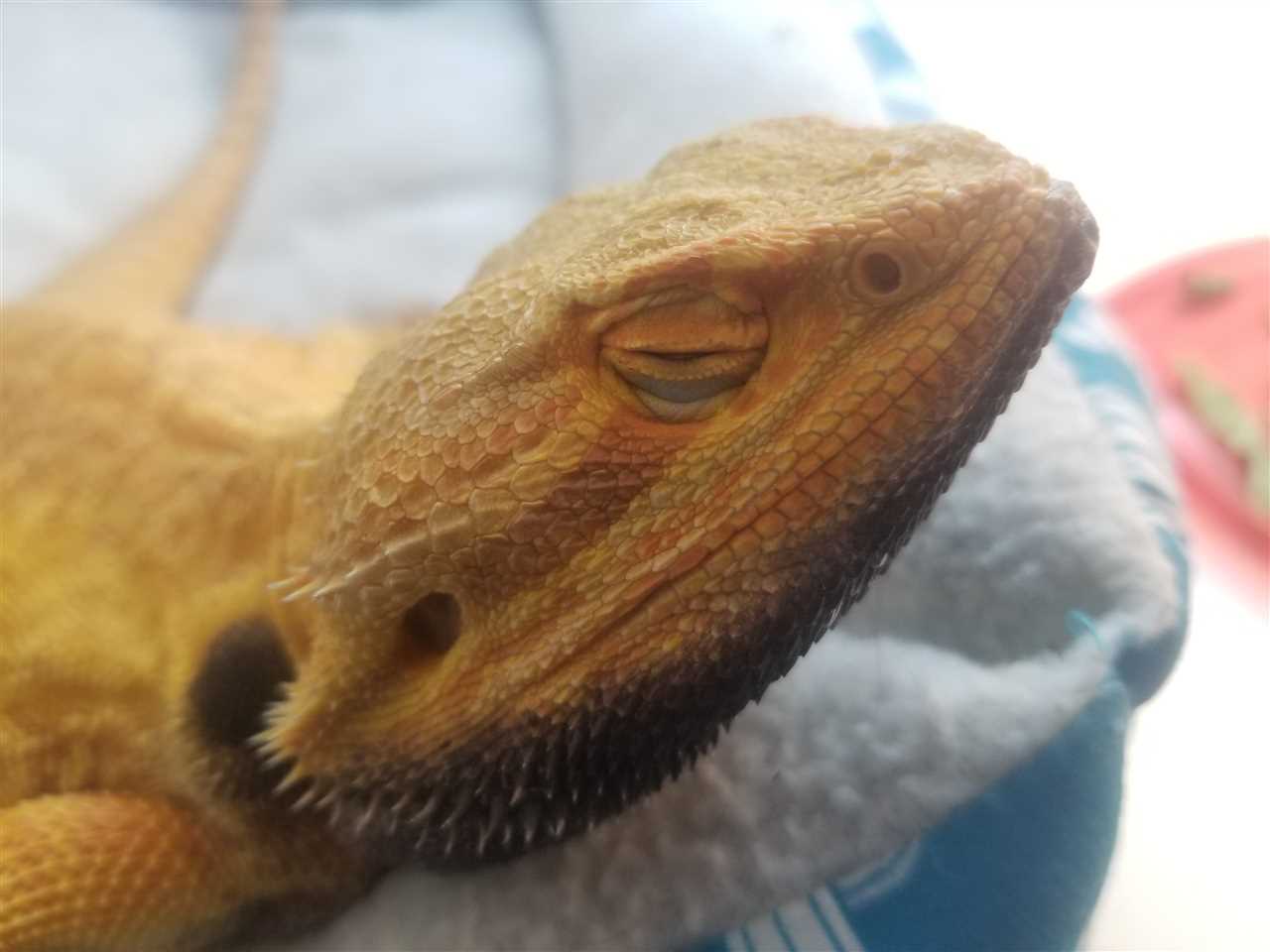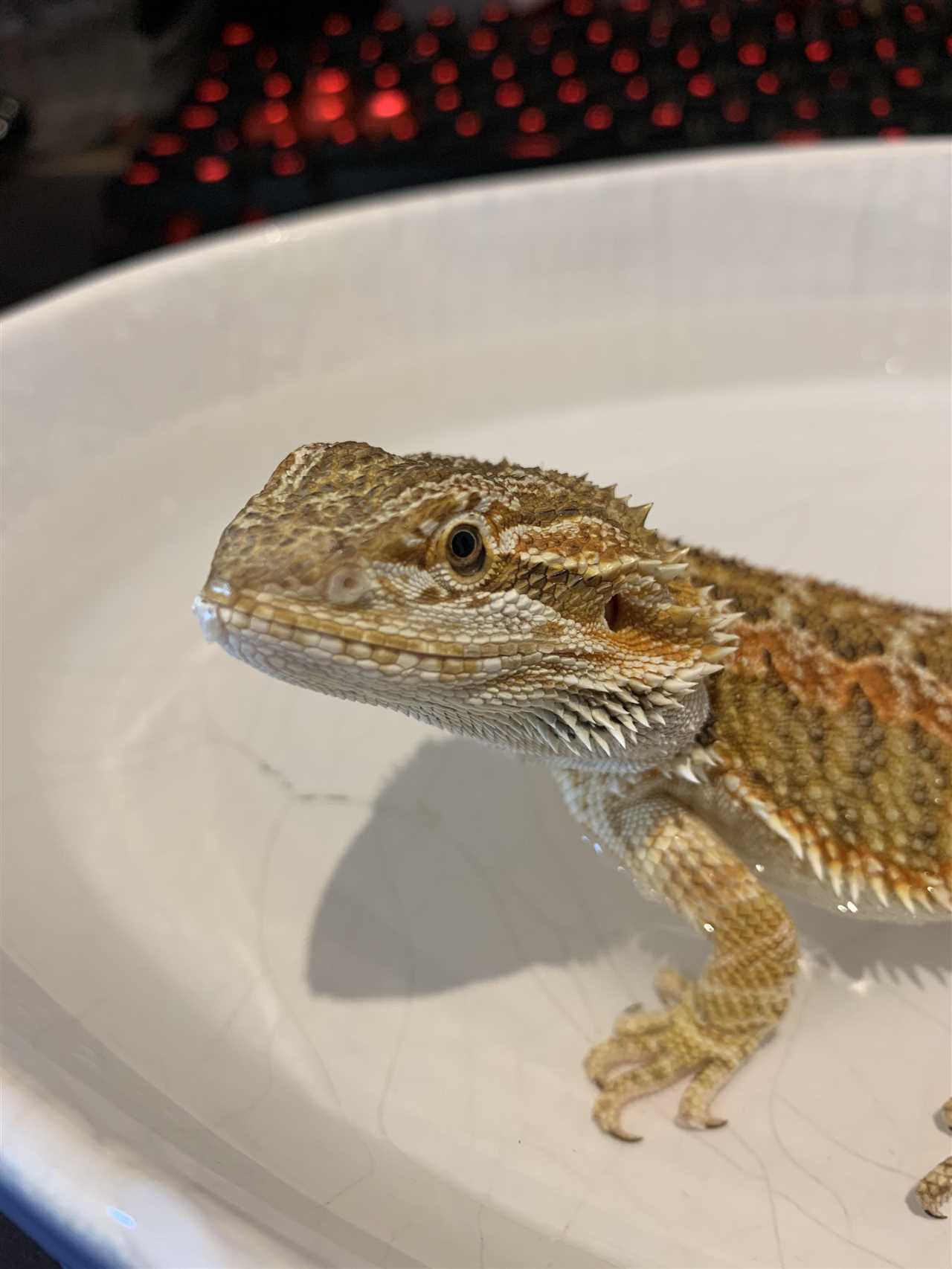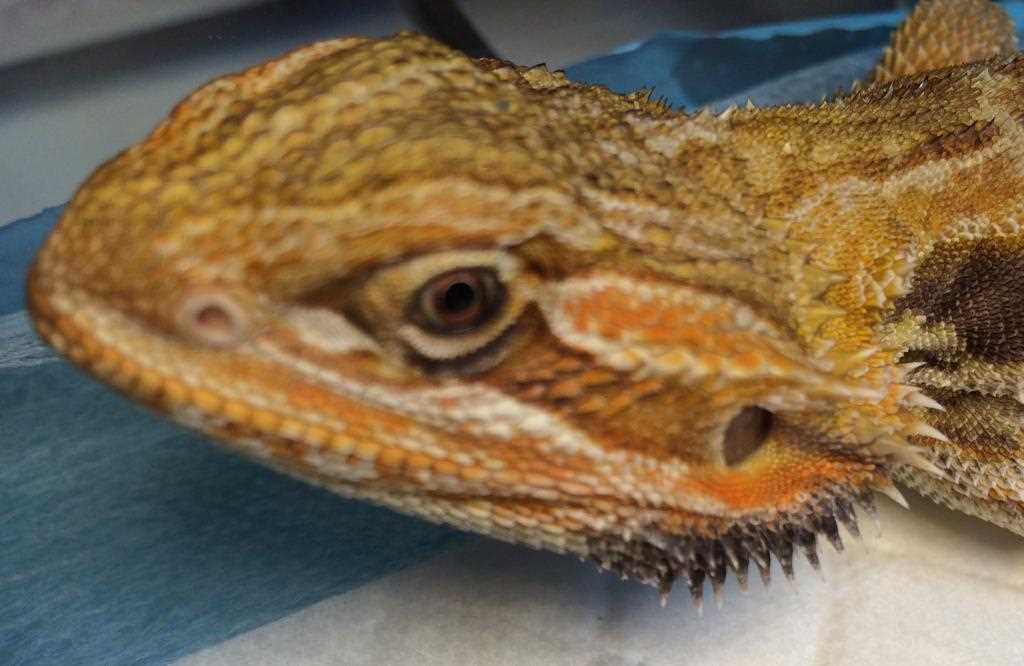
There are several factors that can contribute to the development of sunken eyes in bearded dragons. One common cause is dehydration. Insufficient water intake or environmental conditions that promote water loss can lead to dehydration, which in turn can result in sunken eyes. Additionally, nutritional deficiencies, especially a lack of vitamin A, can also contribute to this condition.
Treating sunken eyes in bearded dragons involves addressing the underlying causes. Firstly, ensuring proper hydration is crucial. Bearded dragons should have access to fresh water at all times, and their enclosure should provide a humid environment to prevent excessive water loss. Additionally, a balanced diet with adequate vitamin A is essential for overall eye health. Supplementing your dragon’s diet with appropriate vitamins and minerals may be recommended by a reptile veterinarian.
Causes of Sunken Eyes in Bearded Dragons
Dehydration
One of the primary causes of sunken eyes in bearded dragons is dehydration. These reptiles require an adequate water supply to stay hydrated, and a lack of water can lead to various health problems, including sunken eyes. Dehydration can occur due to a variety of reasons, such as insufficient access to water or illness affecting the bearded dragon’s ability to drink.
Malnutrition
Another potential cause of sunken eyes in bearded dragons is malnutrition. Bearded dragons require a well-balanced diet to thrive and maintain optimal health. A lack of essential nutrients can lead to various health problems, including sunken eyes. Poor diet choices, such as feeding an imbalanced or inadequate diet, can result in malnutrition.
Treatment for Sunken Eyes in Bearded Dragons
When a bearded dragon develops sunken eyes, it is essential to address the underlying cause and provide appropriate treatment. Rehydration plays a crucial role in treating dehydration-related sunken eyes. This can involve offering water to the bearded dragon using a syringe or dropper and ensuring they are drinking enough fluids.
Additionally, addressing malnutrition is crucial in improving the overall health of bearded dragons with sunken eyes. Adjusting their diet to provide the necessary nutrients and consulting with a veterinarian or reptile specialist can help create a proper nutrition plan. Supplements may also be recommended to ensure the bearded dragon receives all the essential vitamins and minerals.
Dehydration
One of the common causes of sunken eyes in bearded dragons is dehydration. Dragons require access to fresh water at all times to stay hydrated. Without sufficient water intake, they can become dehydrated, leading to various health issues, including sunken eyes.
Dehydration occurs when the body loses more fluids than it takes in. This can happen due to several factors, such as high temperatures, inadequate humidity levels, inadequate water supply, illness, or imbalanced electrolytes.
When a bearded dragon is dehydrated, its body tries to conserve water, resulting in sunken eyes. Dehydration can also cause other symptoms like lethargy, loss of appetite, wrinkled skin, and weight loss. If left untreated, severe dehydration can lead to organ failure and death.
Symptoms of Dehydration

It is essential to recognize the early signs of dehydration in bearded dragons to provide prompt treatment. Some common symptoms of dehydration include:
- Dry and sunken eyes
- Lethargy and weakness
- Loss of appetite
- Decreased urination
- Wrinkled or loose skin
- Weight loss
- Dark or concentrated urine
- Decreased elasticity of the skin
Treatment for Dehydration
To treat sunken eyes caused by dehydration in bearded dragons, it is crucial to rehydrate them immediately. This can be done by offering them fresh water to drink. If they do not drink voluntarily, you may need to gently syringe-feed them with water or provide a shallow water dish that is easily accessible.
In severe cases of dehydration, it is best to consult a reptile veterinarian who can administer fluids intravenously or subcutaneously. They may also run tests to determine if there are any underlying health issues contributing to the dehydration.
Preventing dehydration in bearded dragons involves ensuring they have access to clean and fresh water at all times. It is also important to maintain appropriate humidity levels in their enclosure, provide a water source that is easily accessible, and monitor their water intake regularly.
Causes and Treatment for Sunken Eyes in Bearded Dragons
One of the main causes of sunken eyes in bearded dragons is dehydration. When bearded dragons do not receive enough water, their bodies become dehydrated, which can lead to sunken eyes. Dehydration can occur due to insufficient water intake or environmental conditions that promote water loss, such as high temperatures or low humidity.
Another cause of sunken eyes in bearded dragons is malnutrition. Bearded dragons require a balanced diet that includes a variety of insects, vegetables, and fruits in order to receive the necessary nutrients. If their diet lacks essential nutrients, it can lead to nutritional deficiencies, weakened immune system, and various health issues, including sunken eyes.
Treatment for sunken eyes in bearded dragons involves addressing the underlying causes. The first step is to rehydrate the affected dragon. This can be done by providing clean, fresh water in a shallow dish and ensuring that the enclosure is properly misted to increase humidity levels.
Treatment for Sunken Eyes in Bearded Dragons
If you notice that your bearded dragon has sunken eyes, it is crucial to rehydrate them immediately. Dehydration can be life-threatening for these reptiles, as it can lead to organ failure and even death.
Rehydration

The first step in treating sunken eyes in bearded dragons is to rehydrate them. You can do this by providing your dragon with access to clean, fresh water at all times. It is essential to ensure that the water is easily accessible and at the appropriate temperature for your dragon’s needs.
In addition to offering water, you can also encourage your bearded dragon to drink by misting their enclosure with water. This will create a humid environment and increase the likelihood of them drinking. It is advisable to mist the enclosure several times a day, especially during warmer months.
It is also important to monitor your dragon’s water intake and make sure they are drinking enough. If you find that they are not drinking on their own, you may need to assist them by gently syringe-feeding water. Be careful not to force them to drink too much at once, as this can cause further stress or discomfort.
Proper Nutrition
In addition to rehydration, providing your bearded dragon with a proper diet is crucial for treating sunken eyes. Malnutrition can contribute to the development of this condition, so it is essential to ensure your dragon is receiving the necessary nutrients.
Consulting with a reptile veterinarian or an experienced reptile keeper can be beneficial in determining the best diet for your bearded dragon.
Treatment for Sunken Eyes in Bearded Dragons
In order to address the issue of sunken eyes in bearded dragons, it is crucial to first identify and treat any underlying causes such as dehydration or malnutrition. If these factors are not properly addressed, the treatment for sunken eyes may not be effective in the long run.
In addition to water, you can also offer your bearded dragon electrolyte solutions that are specifically formulated for reptiles. These solutions help to replenish essential minerals and electrolytes that are lost during dehydration.
Treatment for Sunken Eyes in Bearded Dragons
Sunken eyes in a bearded dragon can be a sign of underlying health issues that require immediate attention. Proper treatment is essential to ensure the well-being and recovery of your dragon.
Rehydration
One of the primary causes of sunken eyes in bearded dragons is dehydration. It is crucial to address this issue promptly and provide the necessary hydration to your dragon.
Here are some steps to rehydrate your bearded dragon:
- Offer fresh water: Ensure that clean and fresh water is always available for your dragon. Place a shallow dish of water in its enclosure to encourage drinking.
- Soak in warm water: Gently soak your dragon in a shallow bath of warm (not hot) water for about 15-20 minutes. This helps to rehydrate the skin and stimulates drinking.
- Provide electrolytes: If your dragon is severely dehydrated, you can offer electrolyte solutions specifically designed for reptiles. These solutions help to replenish essential minerals and fluids.
- Monitor drinking: Keep a close eye on your dragon’s drinking habits. If it is not drinking or showing signs of improvement within a day, consult a veterinarian.
Remember, dehydration can be a serious issue for bearded dragons, and proper rehydration is vital for their recovery.
Proper Nutrition
Malnutrition can also contribute to sunken eyes in bearded dragons. Providing a balanced diet is crucial for their overall health and well-being.
Here are some essential tips for proper nutrition:
- Variety of food: Offer a diverse range of insects, vegetables, and fruits to ensure your dragon receives a balanced diet.
- Calcium and vitamin supplements: Dusting the food with calcium and vitamin supplements helps to prevent nutritional deficiencies.
- Avoid toxic foods: Some foods, such as avocado and rhubarb, can be toxic to bearded dragons. Familiarize yourself with safe and suitable food options.
- Feed in appropriate quantities: Bearded dragons have specific feeding requirements and should be fed according to their age and size. Avoid overfeeding or underfeeding.
By providing a proper diet, you can ensure your bearded dragon receives the necessary nutrients for healthy eye function and overall well-being.

I’m Lena Adams—a product of an unconventional upbringing in the African wilderness. My father, a daring explorer of African wildlife, sparked my fascination with reptiles, a passion that intertwined with the tragic loss of my mother during an expedition, leaving an indelible mark on my life. Driven to understand the creatures that captivated my parents, I embarked on my journey, sharing insights about reptiles, frogs, and lizards on my website. Through my explorations and conservation efforts, I honour my family’s legacy while seeking connections—to the creatures, nature, and the mother whose presence I yearn to understand.
